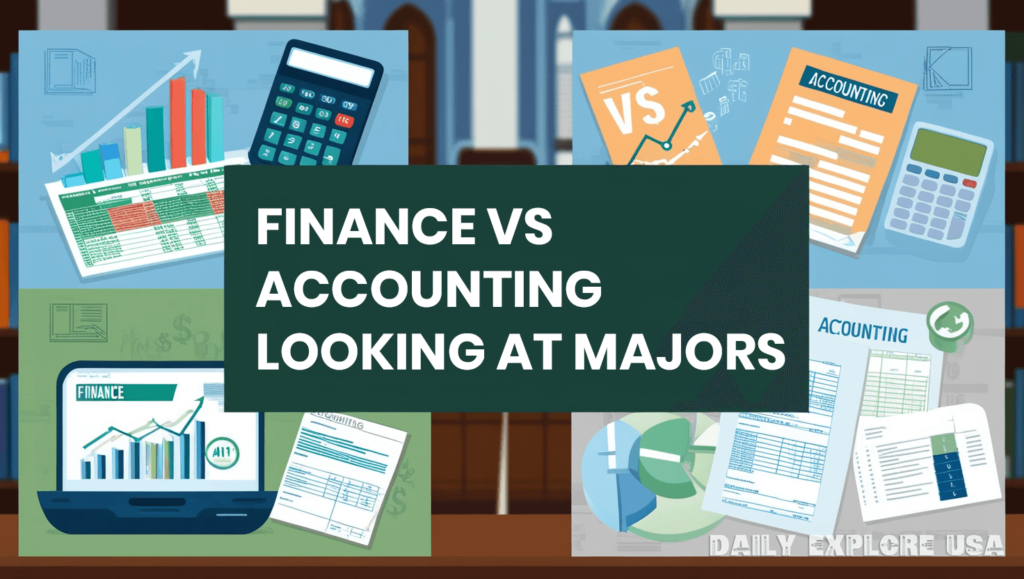If you like numbers, a business degree offers great options like finance and accounting. While both involve mathematics, accounting focuses on analyzing past data, while finance projects future trends. Deciding between the two depends on whether you are more interested in understanding history or shaping the future. Both are strong career paths for math-minded individuals.
What is a finance degree?

A finance degree equips you to manage and plan an organization’s assets, focusing on securing funding, allocating resources and analyzing costs. You will work closely with investors or executives to set financial goals and create strategies to achieve them. It’s a career that blends financial planning with big-picture decision-making.
What is an accounting degree?

An accounting degree, whether a bachelor’s or master’s, prepares you to analyze and track an organization’s assets. Unlike finance majors, accountants focus on cash flow management, financial reporting and tax issues, following standard practices such as GAAP. While finance professionals work toward strategic goals, accountants adhere to established accounting principles. To excel in this field, obtaining a Certified Public Accountant (CPA) certification is often essential.
Finance vs. Accounting Degree: Differences
| Aspect | Finance Degree | Accounting Degree |
|---|---|---|
| Focus | Managing investments, financial planning, and strategic decision-making. | Tracking and reporting financial transactions, compliance, and tax management. |
| Core Skills | Investment analysis, risk management, portfolio management. | Financial reporting, auditing, cash flow management. |
| Career Roles | Financial Analyst, Investment Banker, Portfolio Manager. | Accountant, Auditor, Tax Advisor. |
| Certifications | Chartered Financial Analyst (CFA), Certified Financial Planner (CFP). | Certified Public Accountant (CPA), Certified Management Accountant (CMA). |
| Work Environment | Dynamic, often involving high-stakes decisions and strategic planning. | Structured, focusing on accurate financial reporting and compliance. |
| Goals | Focused on growth, profitability, and financial strategy. | Focused on accuracy, compliance, and financial record-keeping. |
| Typical Tasks | Preparing financial statements, conducting audits, and managing tax-related matters. | Preparing financial statements, conducting audits, managing tax-related matters. |
Finance vs. Accounting Degree: Similarities
| Similarity | Finance Degree | Accounting Degree |
|---|---|---|
| Financial Focus | Both involve working with financial data and managing money. | Both involve working with financial data and managing money. |
| Analytical Skills | Requires strong analytical skills to assess financial information. | Requires strong analytical skills to assess financial information. |
| Career Opportunities | Offer careers in financial services and business management. | Offer careers in financial services and business management. |
| Regulatory Knowledge | It involves interpreting financial reports and data for decision-making. | Both need understanding of financial regulations and standards. |
| Data Interpretation | Involves interpreting financial reports and data for decision-making. | Involves interpreting financial reports and data for accuracy and compliance. |
| Quantitative Skills | Both need an understanding of financial regulations and standards. | Emphasizes quantitative analysis and detailed financial record-keeping. |
| Professional Certifications | May lead to certifications like CFA or CFP. | Often requires certifications like CPA or CMA. |
| Educational Background | Emphasizes quantitative analysis and financial modelling. | Both need an understanding of financial regulations and standards. |
What do accounting degrees cover?
An accounting degree lays the foundation for a variety of specialized careers, from basic bookkeeping to managing complex financial statements. It focuses on the analysis of financial information to assess the economic health of a business and extends to areas such as planning, decision-making, and compliance. While a bachelor’s degree is sufficient for many roles, advanced qualifications or postgraduate study can lead to higher specialities such as forensic accounting or international accounting. Professional certifications may be required, and some may be hired with employer support.
What do finance degrees cover?
A finance degree opens the door to lucrative careers in business, banking, and consultancy, often offering higher earning potential than accounting roles. It emphasizes the management and forecasting of financial data for future developments rather than merely recording past transactions. Specializations in finance include corporate finance, economic modelling, investment management, and more, with many offered as dedicated postgraduate courses. This degree equips professionals to forecast profits, evaluate funding options, and comprehensively analyze financial trends.
Accounting and finance degree entry requirements
For undergraduate studies in accounting or finance, no specific work experience or previous qualifications are required, but strong numerical skills and a genuine interest are essential. High school and A-levels in STEM and business subjects, along with relevant extra courses such as Maths Club, are beneficial. For graduate programs, an appropriate undergraduate degree and relevant work experience is preferred. However, strong quantitative and analytical skills demonstrated by exams such as the GMAT or GRE may also be considered. For more details, please visit a website.
Finance vs Accounting: Looking at majors

When comparing college courses for finance and accounting degrees, there is considerable overlap, but major differences emerge, especially in advanced classes.
Finance Major
Core Courses: Investment, Risk Management, Financial Statement Analysis, Corporate Finance, International Finance and Economics. Advanced courses include quantitative methods, economic forecasting, and financial modelling.
Features
- FinTech: Leveraging Technology to Enhance Financial Services.
- General Finance: A comprehensive study of financial management and investments.
- Real Estate: Finance applied to property transactions and investments.
- Corporate Finance: Management of financial operations in businesses.
- Financial Planning: Formulating strategies based on current economic data.
Accounting Major
Major Courses: Accounting Theory, Tax Law, Ethics, Generally Accepted Accounting Principles (GAAP), Financial Statement Preparation, Cost Analysis and Auditing.
Features
- Tax Planning: An in-depth study of tax laws and their impact on various organizations.
- Public Accounting: Expertise in auditing, tax services, and financial reporting for various clients.
- Forensic Accounting: Using accounting skills to investigate and prevent financial crimes.
- Managerial Accounting: Focus on strategic planning, budgeting, and financial analysis.
Both degrees prepare you for different career paths, with an emphasis on financial management and investments and accounting with a focus on financial reporting and compliance.
Finance vs Accounting: Choosing your career path

Finance Degree Careers
Entry-level
Junior Financial Analyst
- Collects and analyzes financial data.
- Assists in forecasting and budgeting.
- Supports senior analysts in decision-making.
Loan Officer: Helps individuals and businesses select and apply for loans, evaluate creditworthiness, and manage the loan approval process.
Mid-level
Financial Examiner: Monitors financial transactions and ensures that they comply with laws and regulations. Performs audits and reviews to maintain financial integrity.
Insurance Analyst
- Evaluates the risks and profitability of insurance policies.
- Updates policies.
- Verifies records.
- Improves operational efficiency for insurance companies and policyholders.
Senior-level
Investment Banker: Facilitates capital raising through complex financial transactions, including issuance of securities, and manages mergers, acquisitions, and sales.
Personal Financial Advisor: Provides customized financial and investment advice to individuals based on their financial goals and needs.
General and Operations Manager: Oversees all operations in a company or organization with the goal of improving efficiency and profitability.
Accounting Degree Careers
Entry-Level
Revenue Agent: Works with government agencies such as the IRS to examine and audit tax returns, ensuring accuracy and compliance with tax laws.
Fund Accountant: Manages accounting duties and reports for investment funds, private equity, non-profits, and real estate, ensuring accurate financial reporting.
Bookkeeper: Records and maintains financial transactions for businesses or organizations, ensuring accurate and up-to-date financial records.
Mid-level
Public Accountant (CPA): A CPA provides accounting services to multiple clients, including individuals and corporations, after obtaining a license. Provides services such as audit, tax preparation, and financial advice.
Corporate Accountant: Manages internal accounting functions for an organization, including financial reporting, budgeting, and compliance.
Tax Manager: Manages tax compliance, prepares and files tax returns, and analyzes tax laws to optimize tax strategies and ensure compliance.
Senior-level
Auditor: Evaluates financial reports to ensure they comply with Generally Accepted Accounting Principles (GAAP) and audits to verify accuracy and integrity.
Controller: Oversees the company’s accounting operations, including financial reporting, compliance, and internal controls, ensuring accurate and timely financial data.
Forensic accountant: combines accounting skills with investigative skills to uncover and prevent financial crimes such as fraud or embezzlement, often involving legal action.
Both finance and accounting careers offer a variety of roles in a variety of sectors, from corporate to government and non-profit organizations. Each career path has different responsibilities and opportunities for advancement, catering to various interests and skill sets.
Finance vs Accounting Salaries: Which pays more?
Both finance and accounting degrees offer attractive career prospects, but finance typically has a higher average starting salary. In 2023, finance majors averaged $61,456, while accounting majors began at $53,444, according to NACE. However, factors such as location, specific career paths, and professional certifications such as CPA or CMA, often leading to higher salaries and more opportunities with advanced qualifications, can significantly affect earning potential.
Finance vs. Accounting: Salary Expectations

| Aspect | Finance Degree | Accounting Degree |
|---|---|---|
| Average Starting Salary | $61,456 | $53,444 |
| Influencing Factors | Location: Higher cost-of-living areas can lead to higher salaries. Career Path: Specific finance roles may have higher earnings. Licensure: Certifications like CFA can boost salary. | Location: Cost of living impacts salary. Career Path: Certain accounting roles can be very high-paying. Licensure: CPA or CMA certifications can lead to higher earnings. |
| High Earning Potential Roles | Investment Banker Financial Advisor Portfolio Manager | Corporate Controller Forensic Accountant Tax Manager |
| Professional Certifications | Chartered Financial Analyst (CFA) Certified Financial Planner (CFP) | Certified Public Accountant (CPA) Certified Management Accountant (CMA) |
| Career Progression Impact | Advanced roles and certifications can significantly increase salary. | Advanced roles and certifications can lead to higher salaries and more opportunities. |
Finance vs. Accounting: Top Jobs
| Aspect | Finance Degree | Accounting Degree |
|---|---|---|
| Entry-Level Roles | Junior Financial Analyst: Analyzes financial data and assists with forecasts and budgets. Loan Officer: Helps individuals and businesses secure loans and assess creditworthiness. | Bookkeeper: Maintains financial transactions and business records. Fund Accountant: Manages accounting for investment funds or non-profits. |
| Mid-Level Roles | Financial Examiner: Ensures financial transactions comply with laws. Insurance Analyst: Assesses risks and profitability of insurance policies. | Corporate Accountant: Handles internal accounting functions, including financial reporting and compliance. Tax Manager: Manages tax compliance and strategy, prepares returns, and analyzes tax laws. |
| Senior-Level Roles | Investment Banker: Facilitates capital raising and manages mergers and acquisitions. Personal Financial Advisor: Provides tailored financial advice to clients. General and Operations Manager: Oversees operations to improve efficiency and profitability. | Auditor: Reviews financial reports to ensure adherence to GAAP. Controller: Oversees accounting operations and financial reporting for a company. Forensic Accountant: Investigates and prevents financial crimes using accounting expertise. |
| Career Focus | Financial Management: Managing and growing assets, strategic financial planning. Investment and Advisory Services: Providing financial advice and managing investments. | Financial Reporting: Ensuring accuracy in financial records and compliance. Compliance and Audit: Verifying adherence to accounting standards and laws. |
| Typical Employers | Investment banks Financial planning firms Corporations Consulting firms | Accounting firms Corporations Government agencies Non-profits |
| Skill Emphasis | Analytical skills Strategic planning Risk management Financial modeling | Attention to detail Regulatory knowledge Financial reporting Auditing and compliance |
Choosing between a finance and accounting degree ultimately depends on your career aspirations and interests. A finance degree is ideal for those interested in investing, strategic financial planning and forecasting economic trends. It offers opportunities for highly rewarding careers like financial analyst, investment banker, and personal financial advisor. If you want to learn more articles on topics you are interested in, you can visit our website. https://dailyexploreusa.com/
In contrast, accounting degrees focus on detailed financial reporting, compliance and audit functions. It is suitable for individuals who excel in meticulous record-keeping and economic analysis, leading to roles such as auditors, tax managers and forensic accountants.
Which degree is better, accounting or finance?
Finance offers a wide range of career opportunities with potentially higher salaries but less predictability. In contrast, accounting generally provides more stable and predictable roles, though often with lower salaries.
What pays more, finance or accounting?
The National Association of Colleges and Employers reports that accounting graduates in the US earn an average annual salary of $57,511, while finance graduates average around $58,464.
Can a finance major be an accountant?
If you have a bachelor’s degree in finance or another business-related discipline, you’re in a good position to pursue CPA certification. Most states allow candidates with a finance degree to sit for the CPA exam as long as other educational requirements, such as accounting coursework, are met. A financial background gives you a strong understanding of economic principles, which complements the accounting skills needed to succeed as a CPA. Many professionals with finance degrees find the CPA credential valuable in moving into roles such as financial analysis, auditing, and consulting services. Combining finance with a CPA opens the door to a wide range of career opportunities in both corporate and public accounting.
Is finance a hard major?
Finance can be a challenging major due to unfamiliar concepts, industry-specific terminology, and a heavy focus on math. These factors make it the chosen field for many students.
Should I major in both accounting and finance?
Whether you choose accounting or finance, a double major opens up a variety of career opportunities, such as becoming a certified public accountant or financial analyst. It equips you with skills for a wide range of roles.

